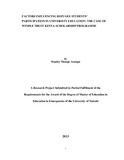| dc.description.abstract | The purpose of this study was to establish factors influencing participation of students of
refugee status in university education in Kenya. The specific objectives of the study were:
To identify factors that influence participation of refugee students in university education
in Kenya, to determine socioeconomic factors influencing participation of refugee
students in university education in Kenya, to establish academic background factors
influencing participation of refugee students in university education, to determine
psychosocial factors influencing participation of refugee students in university education
in Kenya and to identify the challenges faced in the implementation of the WTK
university scholarship programme for refugees as an intervention.
The study employed a case study research design and targeted all the 26 undergraduate
students of refugee status in the WTK scholarship programme in 2013, one university
member of staff from Nairobi, Kenyatta, Moi, Masinde Muliro, African Nazarene, Jomo
Kenyatta and Egerton universities. One educational officer from WTK, UNHCR and
Refugee Education Trust were also targeted. The total targeted respondents were 36 and
32 of them which was 89% participated in the study. The study used interview method as
the main data collection method which was supplemented by document analysis and
observation methods. Reliability of the instrument was tested using the test- retest
method and found reliable.
The findings of the study reveal that despite being offered university scholarships
students of refugee status still face a number of socioeconomic challenges relating to
finance like high cost of housing and family background like poverty. The study also
reveals that the majority of them lacked parental encouragement and support in their
studies because most of them had illiterate parents. The study established that
participation in the university of students of refugee status was negatively affected by
their past education background. It was also found that there were psychosocial factors
negatively influencing participation of students of refugee status in university education
which included trauma, fear of victimization and retention of bitter memories of their past
experiences. Other key findings of the study were that the WTK university scholarship
programme for students of refugee status was facing some challenges which included
inadequate funds and lack of awareness of refugee issues by many departments in the
universities. The study concludes that various socioeconomic, psychosocial, and past
academic based factors influence participation of students of refugee status in university
education. This is despite having the scholarship.
Based on the findings the study recommends that refugee organizations should engage
universities more and form structured partnership to address issues affecting refugee
students in the university. The study also recommends that universities should charge
students of refugee status the same fees charged to Kenyans besides allowing them to live
in university hostels. This will help bring in more refugee students in the university.
There is also need for holistic approach to refugee education besides encouraging peer
couching and peer counselling. The study suggests that a similar study but drawing the
sample from students of refugee status who have sponsored themselves or are sponsored
by other organizations can be done for further research. | |

